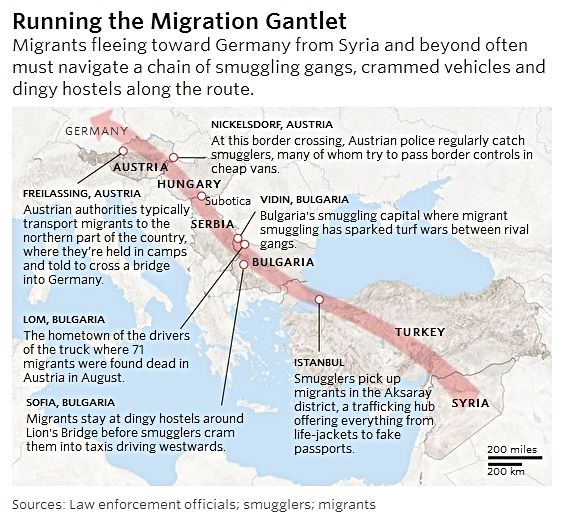 |
Migrants file down the sidewalk at Lion's Bridge
crossing in Sofia, Bulgaria, which has become a nexus
for Bulgaria's rapidly growing migrant-smuggling
business. Photo: Mackenzie Knowles-Coursin/WSJ
|
Once known for smuggling guns and drugs, criminal networks have shifted to human transport
Pensioner Tanya Yakova watches each evening as the central Sofia intersection beneath her third-floor balcony becomes a nexus for a criminal industry flourishing inside Europe’s migrant crisis: people-smuggling.
At dusk, the streets fill with a scrum of drivers, thugs, moneymen and fixers who cram hundreds of people into taxis that speed west toward Germany.
“At least 50 cars drive them away each night, and it’s getting worse,” says Ms. Yakova, whose balcony two blocks from Bulgaria’s border-police headquarters has offered a view on history, from World War II air raids to celebrations when Bulgaria joined the European Union in 2007.
“It’s a mafia market,” she says, dimming her lights to hide from smugglers pacing below.
Across Europe, longtime criminal networks, best-known for smuggling guns and drugs, have shape-shifted to take advantage of the cash bonanza created by record migration from war-torn Syria and beyond.
The new smuggling networks include drivers like one calling himself Ivo—he won’t give his real name—who says he ferries illegal migrants across Bulgaria. Speeding toward the Serbian frontier at 100 miles an hour in a battered Volkswagen and chain-smoking Merilyn Slims, Ivo explains how migrant-moving has overtaken drug-running and cigarette-smuggling.
“The smugglers do it because there’s no money and no jobs,” Ivo says, gesticulating with scarred hands. “Take me to America, and I’ll happily work as your gardener.”
Over just a few months, the crisis has created a migrant-smuggling opportunity between Turkey and Germany that European security officials estimate at billions of dollars. The expansion of smuggling activity—from sophisticated transnational gangs to the lone opportunist equipped with just a phone and a vehicle—poses another thorny challenge for European governments already divided on how to respond to the migrant crisis.
 |
| CLICK MAP to ENLARGE |
New brutality
The entry of established crime syndicates operating between the Middle East and Europe has brought a new level of organization and brutality to the people-smuggling game.
In Sofia, many taxis from Lion’s Bridge drive northwest to Vidin, Bulgaria’s smuggling capital, where gangs move up to 500 migrants nightly across the Timok river into Serbia, Bulgarian officials say. On the town outskirts, smugglers store transiting refugees in pig farms and disused airport hangars. The money at stake has sparked a turf war between rival gangs. One public official seeking to crack down was attacked with a Molotov cocktail.Read the rest of the story HERE.
If you like what you see, please "Like" us on Facebook either here or here. Please follow us on Twitter here.




No comments:
Post a Comment